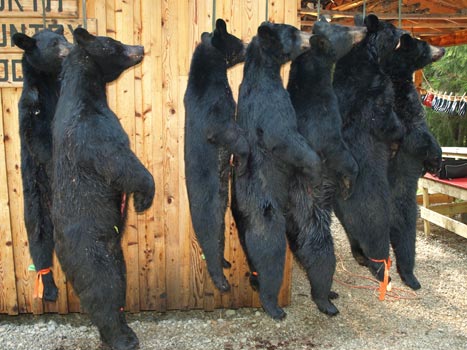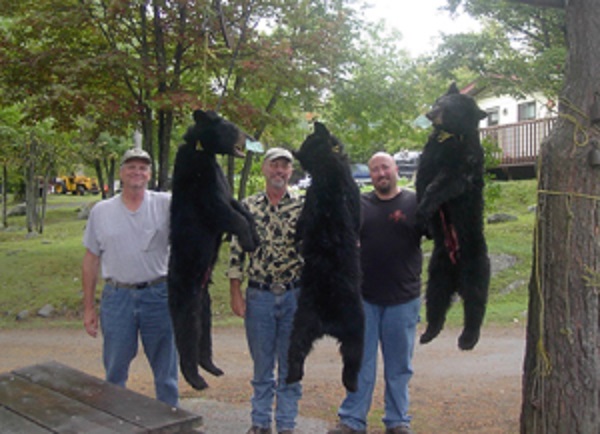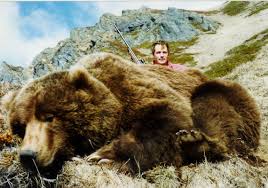Bear hunt and mass killings have become a contentious issue worldwide, with many people advocating for their immediate end. While hunting has been a part of human culture for centuries, the practice has now become a controversial issue, especially when it comes to large mammals such as bears. There are many reasons why people are against bear hunting and mass killings, ranging from ethical concerns to their negative impact on the environment. In this article, we will explore the various aspects of bear hunting and mass killings and delve into the reasons why we should work towards ending these practices.

Introduction: Understanding the Bear Hunt and Mass Killings
The practice of bear hunting and mass killings has been a controversial topic among animal lovers and environmentalists for a long time. While some people may argue that it is necessary for population control or for human safety, others strongly oppose it on moral, ethical, and ecological grounds. In this article, we will explore the issue of bear hunting and mass killings from different perspectives to gain a better understanding of its importance and implications.
The Basics of Bear Hunting and Mass Killings
Bear hunting involves the pursuit, capture, and killing of bears for recreational, commercial or subsistence purposes. Mass killings, on the other hand, refer to the culling of a large number of bears due to reasons such as population control, disease control, or safety concerns. While hunting and mass killing of bears are legal in certain regions, they are banned or heavily regulated in others.
The Importance of Addressing this Issue
The debate on bear hunting and mass killings is not just about animal rights or environmental conservation. It is also about understanding the complexity of human-nature interactions and the need for responsible stewardship of the natural resources we depend on. Addressing this issue requires a deep understanding of both ecological and ethical implications and a willingness to engage in constructive dialogue towards sustainable solutions.
The Ecological Importance of Bears in the Ecosystem
The Role of Bears in the Ecosystem
Bears are apex predators that play a crucial role in maintaining the ecological balance of the ecosystems they inhabit. Their feeding habits help regulate the populations of prey species, prevent overgrazing, and promote forest regeneration. They also serve as seed dispersers, pollinators, and nutrient recyclers that contribute to the health and resilience of the ecosystem.
How Bear Populations Affect Other Species
The presence or absence of bears in an ecosystem can have a cascading effect on other species. For example, studies have shown that the decline of bear populations can lead to an increase in deer populations, which in turn can cause damage to crops and forests, and increase the risk of tick-borne diseases. Bears also help regulate the populations of smaller predators, such as coyotes and raccoons, which can affect other species lower down the food chain.
The Negative Impact of Bear Hunt and Mass Killings on the Environment
The Effect of Bear Hunt on Local Ecosystems
Bear hunting, particularly trophy hunting, can have a significant impact on the local ecosystems. It can disrupt the natural behavior of bears, alter their social dynamics, and reduce their reproductive success. Hunting can also create a vacuum in the ecosystem, allowing other predators and herbivores to thrive, which can have unintended consequences for the ecosystem.
The Wider Environmental Impact of Mass Killing of Bears
Mass killing of bears can also have severe environmental consequences. It can disrupt the ecological balance of the entire region, affecting not just the bear population, but also other species that depend on them. For example, mass killing of bears can lead to an overpopulation of deer or other herbivores, which can cause damage to crops and forests, and increase the risk of Lyme disease.
The Ethical Implications of Bear Hunt and Mass Killings
Examining the Morality of Bear Hunting and Mass Killings
The moral and ethical implications of bear hunting and mass killings are complex and often contested. While some argue that hunting is a necessary part of human culture and tradition, others believe that it is cruel and unnecessary. The question of whether it is ethical to use animals for human purposes, such as recreation or culling, is a contentious one that requires careful consideration.
The Impact of Bear Hunt on Individual Bears and Populations
Bear hunting and mass killings can have a profound impact on individual bears and populations. They can cause immense physical and emotional suffering to the animals, disrupt their social structure, and lead to a decline in their population. Hunting and culling can also have unintended consequences, such as disrupting the genetic diversity of the population or creating a vacuum that allows invasive species to thrive.
In conclusion, bear hunting and mass killings are complex issues that require a multifaceted approach. It is essential to consider both ecological and ethical implications to arrive at sustainable solutions that promote human-nature harmony. Whether through stricter regulations, conservation initiatives, or public education, we can work towards a world where bears and other wildlife can thrive and coexist with humans.
Alternatives to Bear Hunt and Mass Killings: Promoting Coexistence
Bears and humans have been living together for centuries, and coexistence is possible without resorting to hunting and mass killings. Alternative approaches to bear management include implementing non-lethal methods, such as bear-proof garbage cans and electric fencing. Research has shown that such measures can drastically reduce bear-human conflicts.
Alternative Approaches to Bear Management
In addition to non-lethal methods, bear management can also focus on habitat conservation and restoration. This can include protecting key bear habitat areas and restoring degraded habitat. Educating the public on bear safety and responsible behavior can also help reduce bear-human conflicts and promote coexistence.
The Benefits of Coexistence with Bears
Coexistence with bears not only benefits the bears but also has positive impacts on the environment and humans. Bears play a crucial role in maintaining healthy ecosystems as seed dispersers and omnivores. Additionally, bears are an important part of our natural heritage, and their presence can bring economic benefits through eco-tourism.
Political and Economic Factors behind the Bear Hunt and Mass Killings
The decision to allow bear hunting and mass killings is often influenced by political and economic factors. These factors can include pressure from hunting groups and lobbyists, as well as economic interests such as logging and development.
The Role of Politics in Bear Hunting and Mass Killings
Politicians often use bear hunting as a way to appeal to certain voters and special interest groups. In some cases, politicians may also receive campaign donations from hunting and logging groups, influencing their decision-making process.
The Influence of Economic Interests in Bear Hunting and Mass Killings
The logging and development industries often view bears as a nuisance, and their interests can conflict with bear conservation efforts. Some logging and development companies may lobby for the removal of bears from an area to facilitate their operations.
The Role of Community Activism and Advocacy in Stopping the Bear Hunt and Mass Killings
Community activism and advocacy can play a crucial role in stopping the bear hunt and mass killings. This can include raising public awareness on the issue, holding protests and rallies, and lobbying government officials.
How Community Activism can Inspire Change
Community activism can inspire change by raising public awareness and putting pressure on decision-makers. When the public demands change, politicians are more likely to listen and take action.
The Importance of Advocacy for Bear Conservation
Advocacy for bear conservation is crucial for protecting these animals and their habitats. By supporting conservation organizations and lobbying for stronger protections, we can ensure the long-term survival of bear populations.
Conclusion: Taking Action to Protect Bears and the Environment
It's up to all of us to take action to protect bears and the environment. This can include supporting non-lethal methods for bear management, advocating for stronger protections, and raising public awareness on the issue.
What Can We Do to Stop the Bear Hunt and Mass Killings?
We can take action by supporting conservation organizations, contacting our elected officials, and advocating for non-lethal bear management methods.
The Future of Bear Conservation: Hope and Opportunities
While the bear hunt and mass killings may seem overwhelming, there is hope for the future of bear conservation. By working together and taking action, we can ensure the long-term survival of these magnificent animals and their habitats.In conclusion, bear hunt and mass killings are not only ethically questionable but also have harmful effects on our ecosystems. We can work towards promoting coexistence with bears and finding alternative approaches to their management that prioritize their welfare and well-being. Through community activism and advocacy, we can inspire change and protect bears in the wild for generations to come. Let's take action now to conserve these magnificent creatures and the natural world they call home.
FAQ
Why is bear hunting and mass killings an issue?
Bear hunting and mass killings have become a contentious issue worldwide due to the negative impact they have on the environment, the ethical concerns surrounding the killing of large mammals such as bears, and the significant role bears play in the ecosystem.
Are there any alternatives to bear hunting and mass killings?
Yes, there are several alternative approaches to bear management that prioritize coexistence and the welfare of bears while addressing human concerns. These alternatives include non-lethal methods such as bear spray or relocation, community education, and habitat management, to name a few.
What can I do to help stop bear hunting and mass killings?
There are many ways to get involved in advocating for the end of bear hunting and mass killings. You can join organizations that work towards bear conservation, contact your local government representatives to express your concerns, or even participate in peaceful protests.
What is the current situation regarding bear hunting and mass killings?
Bear hunting and mass killings continue to be a problem in many regions, although there are efforts underway to address this issue. Various countries and regions have implemented regulations to limit hunting and promote conservation, and increasingly, voices of opposition are being heard. However, much work remains to be done to ensure that bears are protected and valued as a vital part of our natural world.
_________________________________________
Here's a playlist of videos that I am adding to all the time.
Arctic
Ontario
http://www.ontariospringbearhunt.ca/
http://www.animalalliance.ca/campaigns/ontario-spring-bear-hunt.html
http://www.wildlifeontario.ca/campaigns/springbearhunt/submitpage.php
Florida
Native American Bear Meaning:
Sybolic Wisdom from the Bear
When we walk the Path with the bear, this animal will inevitably tell us about its long history with the First People of North America.
As a Native American symbol, the bear is as free in spirit as the great wind; and grander than its mass. To match that magnitude is the quality of unpredictability in the bear. A massive animal who forages seemingly peacefully in the woods on berries and bush. when provoked in certain ways, the First Peoples witnessed a ferocity expressed from the bear that (understandably) could elicited terror.
Because of this potentially furious storm brewing just under the surface of bears spirit, our native forebears were extremely cautious and respectful of this animal. Even tribes inclined to peace honored the spirit of a warrior, and witnessing the bear seemed to embody that kind of blind, powerful surge of courage and strength that every warrior is want to tap into.
Bear meanings were enhanced by observations made tribal sages. These vital tribal figures were inclined to pensive and deeper understanding of how nature communicated intent in all her forms. These sages found connections between human and beast and from these associations would interpret profound meanings that propelled the community into direction, action, and wisdom.
One such connection to bear meaning comes from a Shoshone sage who, set about bridging worlds in a manner of trance walking. During his trance walk, he was gifted with the site of a clan of bears who were performing what seemed to be a ritual dance.
These were not spirit bears, but real bears, on their hind legs, dancing in the golden rays of the sun. The Shoshone sage understood this to be a dance of gratitude as well as a prayer for the healing and protection of their young. From that point further the Shoshone have instigated their own Sun Dance where the bear is a central figure of the ritual symbolizing protection, strength and continuation of the progeny of the tribe.
Native American Bear Meaning and Symbolism
Power
Courage
Freedom
Protection
Motherhood
Discernment
Childbearing
Resourcefulness
Unpredictability
We see a lot of connections with bear and man in the Native mind. We can intuit these bear meanings to come from the human-like appearance of the bear when it's posed on hind legs. Further, the natives observed the bear looks remarkably human when skinned of its fur.
Bear meanings of motherhood and child protection continue in the Aleut and Haida minds where legend indicates the bear would take a tribal woman as its wife. From this union, man and bear strengthened their greatest aspects, combining the best (and sometimes worst) traits.
As a Sioux symbol, the bear also has healing symbolism. Sioux legend indicates mother bear was weary from carrying her heavy babies in her belly. She was having trouble walking and feared she could not make the journey to the great foraging fields to feed during her final days of pregnancy. She rested against redwood sorrel plant and the plant spoke to her, telling her that if she ate of its leaves her body would be able to sustain her load. Mother bear did as the sorrel advised to discover the treatment worked. She knew her Sioux sisters would have the same troubles when they were heavy with their own babies, so she shared the medicinal advice with the Sioux medicine woman.
The bear is a strong Native American symbol to the Cree who are powerfully connected with the bear. Recognizing its girth, and amazingly effective teeth and claws, the Cree adopted the bear as a symbol for successful hunt. Intricate preparations were made prior to a hunt. These preparations featured the bear as the guest of honor. Every aspect of pre-hunting ritual was designed to honor the bear. Even after the ritual bear skulls would hang in the lodge overnight to induce dreams of bears that provided good luck in the hunt. That is, if the bear was pleased, the dreams would come, and the hunt would be a success.
Above all, bear meaning holds incredible influence and magnitude to the North American tribes. And although the bear is a profound Native American symbol of majesty, freedom and power it is far more. The spiritual connections made with the bear makes it a brother to the First People.
As a brother, the bear imparts this advice to both our ancestors and us today...
Native Wisdom the Bear Imparts to Us
Because the bear is cautious, it encourages discernment to humankind.
Because of a fierce spirit, the bear signals bravery to those who require it.
Because of its mass and physical power, the bear stands for confidence and victory.
Because it prefers peace and tranquility (in spite of its size), Bear calls for harmony and balance.
______________________________
I have much more to come. Please share if you know where I can get more content ... Thanks


